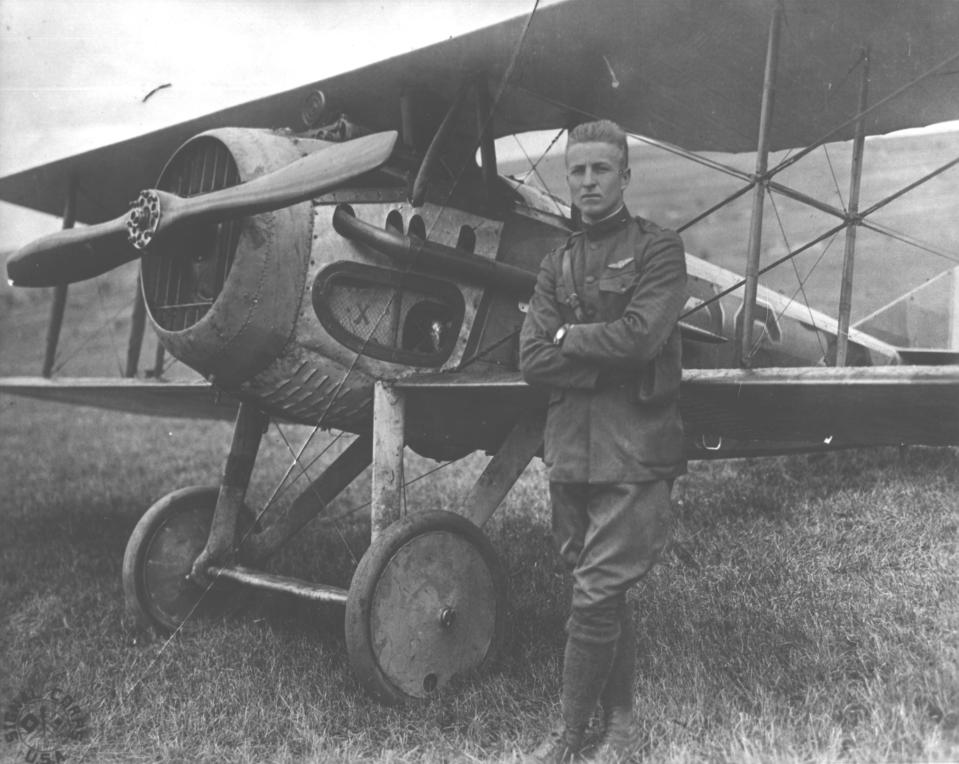Silvestre S. Herrera, one of Arizona's greatest World War II heroes, was born in Mexico
A gray marble monument on state Capitol grounds was installed in 1963.
Inscribed into the monument is the name of the late Silvestre S. Herrera, a Mexican-born soldier who received the Congressional Medal of Honor for outstanding service during World War II.
The medal is the country's highest award for military valor in action.
U.S. Army Pvt. Herrera defended his platoon against heavy machine-gun fire March 15, 1945, near Merzwiller, France, leading to eight German soldiers surrendering, according to the Congressional Medal of Honor Society. Just after his feet were severed when he moved through a minefield, Herrera stopped enemy combatants at a second emplacement.
President Harry Truman handed Herrera the medal, telling him he would have preferred being a Medal of Honor recipient over being president.
"That made me even more proud," Herrera once told The Republic.
In 1986, in another interview, he would tell a Republic reporter, "I don't consider myself a hero."
Herrera was born in 1916 in the Mexican state of Chihuahua. His family moved to El Paso before settling in the Phoenix area, according to historian Pete Dimas. Despite being a Mexican national, Herrera was drafted.
"Didn’t have to go but went anyway,' Dimas said of Herrera, who died in November 2007 in Glendale.
The Migration Policy Institute tabulated 2022 data from the U.S. Census Bureau and found Mexico is the country of birth of 15% of foreign-born U.S. armed forces veterans. As of 2022, there were nearly 731,000 U.S. veterans born outside the country, according to the Migration Policy Institute.

Since 2002, the U.S. military has naturalized more than 170,000 service members, according to the U.S. Citizenship and Immigration Services.
Frank Luke: A look back at the WWI ace posthumously awarded a Medal of Honor
Army sergeant, Marine posthumously honored for WWI heroism
Another World War II soldier of Mexican descent who received the Medal of Honor was the Arizona-born Manuel V. Mendoza, who in 2014 was posthumously honored by President Barack Obama. Mendoza was born in 1922 in Gila County and died in 2001 in Mesa.
Army Staff Sgt. Mendoza’s actions led to the killing of 30 German soldiers on Oct. 4, 1944, near Mount Battaglia, Italy, according to the Congressional Medal of Honor Society. Mortars struck his platoon, wounding him in the arm and leg. Mendoza took a submachine gun and ran toward enemy fire, alternating weapons multiple times.
Mendoza had lived under segregation in the Gila County town of Miami, said Christine Marin, a professor emeritus at Arizona State University,

"Miami ... has this terrible history that people don't talk about much anymore of how Mexican, Mexican Americans faced racism and discrimination in schools, in the community, at work," Marin said.
A state law that was struck down in 1952 had segregated Black students and was used as the rationale for separating Mexican, Mexican American and Native American children into one school in Miami before they entered an integrated high school, Marin said.
Army Staff Sgt. Kazuo Otani rounds out the three World War II Medal of Honor recipients assigned to Arizona by the Congressional Medal of Honor Society. A resident California's Central Valley, Otaini joined the Army and served while his family members were detained at the Gila River internment camp in Arizona.
He visited his parents one last time at the camp before sailing overseas.
Otani was 26 when he died July 15, 1944, near Pieve Santa Luce, Italy, as he rendered aid to a wounded soldier after fighting off enemy combatants, according to the Congressional Medal of Honor Society. He was awarded the medal posthumously in 2000 by President Bill Clinton.
Otani is the only Asian American and Pacific Islander honoree out of Arizona.
U.S. Marine Oscar P. Austin, who died on Feb. 23, 1969, in the Vietnam War, is the only Black honoree.
Who are Arizona's Congressional Medal of Honor recipients?
According to the Congressional Medal of Honor Society website, Arizona is assigned 15 recipients, including Herrera and Mendoza. Here are some of the other men who have received a Medal of Honor on behalf of Arizona, along with the conflict and the date for which they earned commendation.
Frank Luke Jr., U.S. Army Air Service; World War I; Sept. 29, 1918.
John H. Pruitt, Marines; World War I; Oct. 3, 1918.
Billy L. Lauffer, Army; Vietnam War; Sept. 21, 1966.
Frederick E. Ferguson, Army; Vietnam War; Jan. 31, 1968.
Jay R. Vargas, Marines; Vietnam War; April 30-May 2, 1968.
Nicky D. Bacon, Army; Vietnam War; Aug. 26, 1968.
Jose F. Jimenez, Marines; Vietnam War; Aug. 28, 1969.

Tough measure on immigration enforcement
A little less than 100 feet away from the monument with Herrera's inscription is the Arizona Senate building. Republicans on May 22 passed House Concurrent Resolution 2060 to send the bill to a vote in the House chamber. The ballot measure on immigration enforcement, which could appear on the Nov. 5 ballot, would target Latinos, critics have argued.
"No matter how much good we do, there's always going to be people that will try and find a way to push our community out," César Fierros, Living United for Change in Arizona (LUCHA) communications director, said in an interview.
HCR 2060 would make crossing the Arizona-Mexico border a state crime, permit border crossers to be arrested and deported by state officials, block undocumented migrants from state benefits and push for verification of employee immigration status.
Reach breaking news reporter Jose R. Gonzalez at jose.gonzalez@gannett.com or on X, formerly Twitter: @jrgzztx.
This article originally appeared on Arizona Republic: Congressional Medal of Honor heroes assigned to Arizona

